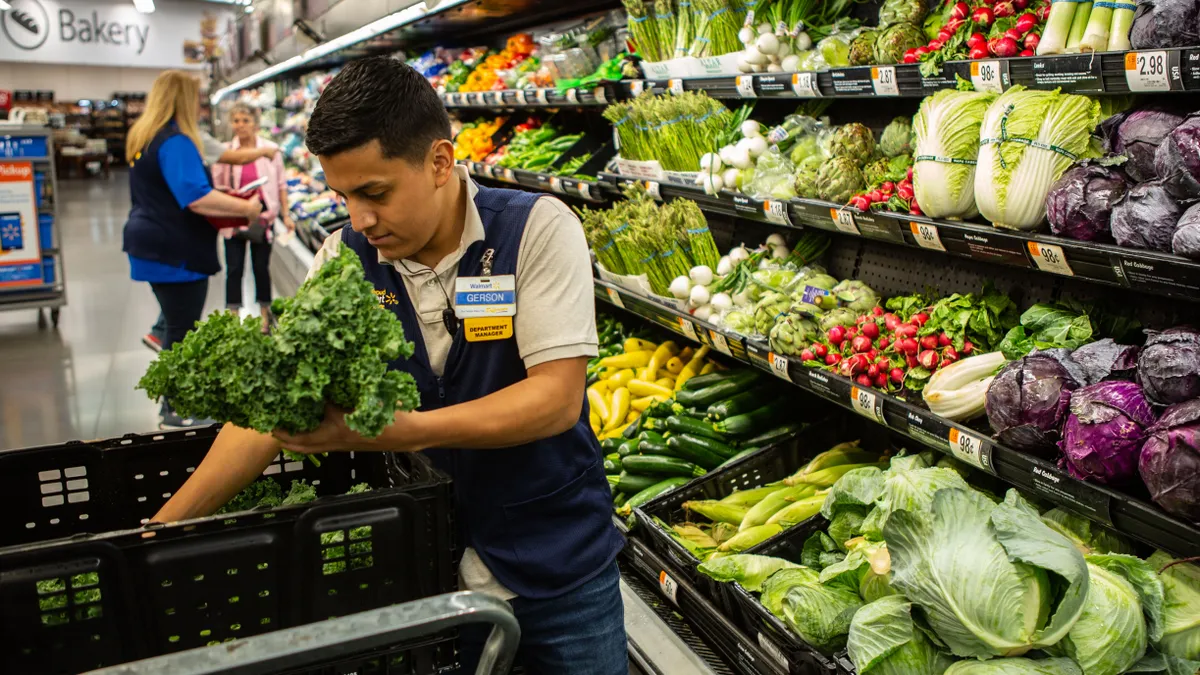Dive Brief:
- Walmart will require all fresh, leafy greens suppliers to implement digital, end-to-end traceability of their products using blockchain by September of next year, according to a company release. IBM, which began testing its blockchain services with Walmart, Kroger and other food companies last year, will provide the software and support for suppliers.
- Frank Yiannas, Walmart’s vice president of food safety, said the retailer plans to establish compliance deadlines for other fruit and vegetable suppliers over the next year, according to Bloomberg. “It’s becoming a business requirement, it’s a part of our supplier agreements,” he told the publication.
- Blockchain serves as a digital ledger that compiles information across the supply chain in a secure, decentralized fashion. In the food industry, it’s touted as a way to quickly and accurately trace products back to their source and provide full transparency for retailers and consumers. Walmart began testing blockchain in 2016, when it traced Chinese pork and fresh mango back to their sources.
Dive Insight:
Blockchain is still in its early stages, and questions about best practices, costs to companies, how it will be regulated and the technology’s ability to deliver remain. But Walmart has decided it’s seen enough to move forward. The decision — and the performance of IBM’s blockchain program in the months ahead — could send waves across the industry.
Blockchain works by grouping data into individual “blocks” that are secure, inalterable, and can be easily distributed. When it comes to food safety and traceability, blockchain promises to replace the paper records and manual input systems retailers have traditionally relied upon with a fast, automated and secure program.
The results of Walmart’s early tests are staggering. When vice president of food safety Frank Yiannis charged his team with tracing a package of mangoes back to its source farm using traditional methods, it took them just under seven days to do so. When the team used IBM’s blockchain program, it took just 2.2 seconds.
“We believe that blockchain could do for food traceability and transparency what the internet did for communication,” Yiannis said during a presentation at the Shoptalk conference in Las Vegas earlier this year.
Food recalls happen on a daily basis for supermarkets, and blockchain could help retailers quickly pinpoint the source of the problem without having to pull mass quantities of product. Grocers across the country pulled romaine lettuce from their shelves following an E. coli outbreak earlier this year, and suppliers took a major hit to their bottom line and their image.
But food safety isn’t the only application experts are touting for blockchain. It can also deter hackers, fight food fraud and help suppliers and organizations develop consumer-facing applications. Early this year, Viant and the World Wild Fund for Nature unveiled a blockchain program that offers consumers a way to track a fish's history, from the ocean to the dinner plate.
As Yiannis tells it, the ultimate benefit of blockchain is full transparency across the food system. Retailers can make sure suppliers are following proper safety protocol, that an organic apple is truly organic, and that pallets of locally grown lettuce are taking the most efficient route from the farm to the store.
But blockchain’s revolutionary potential is still just that at this point. In addition to questions over best practices and how the technology will be regulated, there’s a lack of knowledge that will require extra attention from retailers and service providers as blockchain expands. According to a survey by Deloitte, 39% of executives at U.S. companies say they have little or no knowledge of blockchain.
A company spokeswoman told TechCrunch that IBM will guide suppliers through the process of uploading their data to the blockchain program.
“Think about when you get a new iPhone — the instructions are easy to understand and you’re quickly up and running. That’s the aim here,” she said. “Essentially, suppliers will need a smart device and internet to participate.”
Are the benefits of blockchain as varied and revolutionary as Walmart claims? That's unclear. What's more certain is the impact this move will have across the industry. For better or for worse, blockchain has gotten the kickstart it needs to achieve widespread implementation at grocery stores and other retail outlets.













